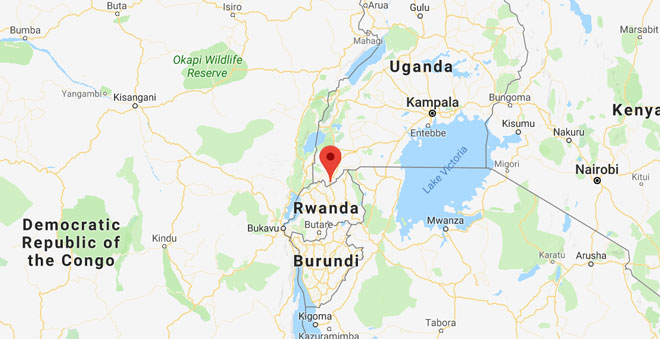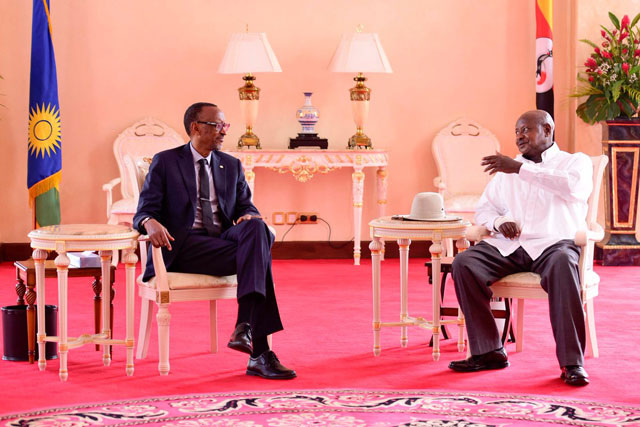
In 2001, a day before the London meeting, Museveni had appointed Maj. Gen. James Kazini, who had no love lost with Kigali, to replace Lt. Gen. Jeje Odongo as acting head of the army. Kazini was in charge of UPDF operations in Eastern Congo when the first clash broke out in Kisangani. He was clearly identified as responsible by a joint investigation team led by the former UDPF commander, General Jeje Odongo, and the RPA Brig. Gen. Kayumba Nyamwasa. He was reportedly infuriated that his former guards-turned Rwanda generals could defeat him in battle and was seething for revenge.
Kagame responded to Museveni’s move by appointing Kazini’s nemesis in Kisangani, Brig. Gen. James Kabarebe, to be army commander. Rwanda also leaked to the press a humiliating videotape showing Gen. Kazini confessing his responsibility in the Kisangani fighting during the joint investigation.
This time, immediately Kaka and Kandiho were appointed, information circulated in security circles that they had made contact with Kayumba Faustin Nyamwasa, reported leader of an anti-Kagame group; the Rwanda National Congress (RNC) in South Africa. None of this information is verifiable and the Rwanda versus Uganda tension is built on thick pillars of propaganda.
In October 2018, Kagame shuffled his cabinet, removing long-serving Defence Minister Gen. James Kabarebe of Kisangani fame. He had been accusing Uganda of illegally arresting and torturing Rwandans and his removal was seen as conciliatory. It is no longer clear now. Kagame also removed the Inspector General of Police, Emmanuel Gasana. He elevated Dan Munyuza, the former deputy IGP.
Failed mediation
The current regional crisis comes at an odd time when one of the disputants, Rwanda, has the rotational chair of the East African Community which is the obvious mediation body. President Kagame started his tenure on Feb.01.
Apart from Uganda, Rwanda has a long-running feud with its southern neighbor, Burundi. President Pierre Nkrunziza accuses Kagame of supporting regime change in Burundi and supervising the attempted coup d’état of 2015 and harbouring its perpetrators. With three of six principals unable to engage amicably, it is unclear how the EAC affairs will be managed.
Presidents Kagame and Museveni met in March 2018 in Kampala. After the meeting, Kagame said on security matters, there is no fundamental problem between Rwanda and Uganda. He said any incidents can be addressed through better communication.

In 2001, the two countries were forced to form a Joint Ugandan/Rwandan Verification Committee with the UK and others as backers. American, Belgian, Russian and Tanzanian defence officials attended. Teams headed by Colonel Charles Kayonga for Rwanda and then-Maj. James Mugira for Uganda met in Kigali from October 27 to28, 2001.
Then-defence ministers Amama Mbabazi of Uganda and Col. Emmanuel Habyarimana of Rwanda then met for six hours on October 29, 2001 in Kabale to sign an agreement on rebels, information sharing, and troop deployments.
Back then, as now, neither the leaders nor the people of Uganda and Rwanda wanted a conflict or a war between their countries. Yet the tension persisted. At the time, it was proposed that the United Nations and international community threaten them with sanctions and suspension of all bilateral and multilateral aid.
In a recent interview with The EastAfrican newspaper published on Feb.19, Kagame Kagame said Uganda and Rwanda should not even be thinking about or entertaining war.
He said issues causing the growing rift between Rwanda and Uganda, be they egos or bad intentions by some people can be resolved.
“It’s a matter that can be resolved; that must be resolved because the alternative is not something that we should even be thinking about or entertaining,” Kagame said.
He said the two countries have a good foundation and historical links. Despite this, he said, there appears to be a reluctance to resolve the issues.
Instead, Kagame said, Uganda has chosen to listen to the dissidents and act against Rwanda based on the information from the group.
He spoke about the role of open borders under the Continental Free Trade Area and the danger of border barriers. He said open borders should not just be on paper.
“People want to do business; they have families in all these countries and, if you stand in their way, it defeats the purpose,” he said.
“I have seen with my own eyes how Africans are struggling to cross borders, fighting the police and Immigration, but they still find ways,” he said, “They really beat them to it. So, you can imagine having this situation where institutions of government are the ones standing in the way of ordinary people who want to do business.
“You know, even countries may quarrel among themselves — some even have gone to war — but the ordinary people don’t even understand why these quarrels exist. They don’t care. They try to survive. It is happening on either side of whichever border you may look at.”
Existential threats
Rwanda and Uganda are not among the smallest countries in the world geographically. But they are small. This means a ground attack by a determined enemy aimed at capturing the capital and nominally ending sovereignty could be over in a matter of hours. In military strategy, these countries are said to lack “strategic depth”. This means that in case of attack, they do not have wiggle room to absorb the attack, retreat and regroup and launch a counter attack.
Rwanda with an area of just 26,338 sq km is worse off. It is 432km from its northern to southern tip and 488km wide. Such states militarily rely on three defenses; they attack first, build international alliances that can aid them, and mobilise popular support among citizens. Uganda is geographically 10 times bigger than Rwanda.
The Monitor newspaper in Kampala in December 2018 quoted Kagame saying Rwanda does not take lightly threats of invasions from neighbouring countries.
“Those challenges have been changing forms but they remained in substance a security threat. When it comes to us, our history, we don’t take any security challenge lightly. They say once bitten, twice shy. We have had our taste of it, we wouldn’t want to be found wanting in terms of taking care of our security. Big or small, we will take care of it. We have people around us in the region, others far away, disguised as political activists. There are those who help them directly, others who hide it and call it helping people involved in political struggles. We have to remind them that is not their business, because if they think it is their business then the question is `are they inviting us to make it our business to get involved in their politics?’” he reportedly said.
 The Independent Uganda: You get the Truth we Pay the Price
The Independent Uganda: You get the Truth we Pay the Price



Some of the other plays include specific 3-number totals with odds varying from
5:1 to 50:1. Your future jargons along with this match.
42 nations will relish this year Eurovision. http://search.babylon.com/imageres.php?iu=http%3A%2F%2Flpe88.life%2Findex.php%2Fother-games%2Fplay8oy